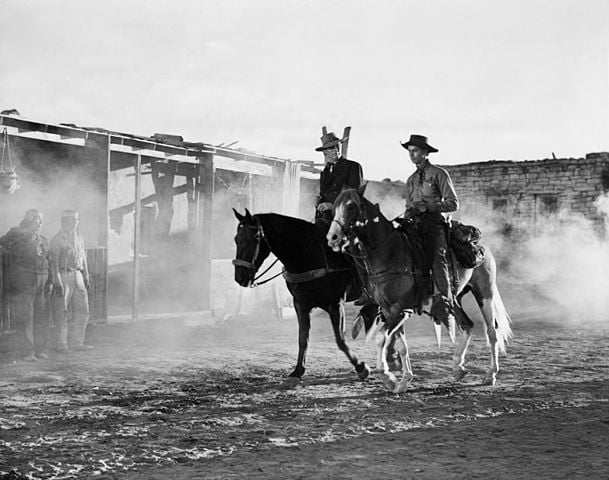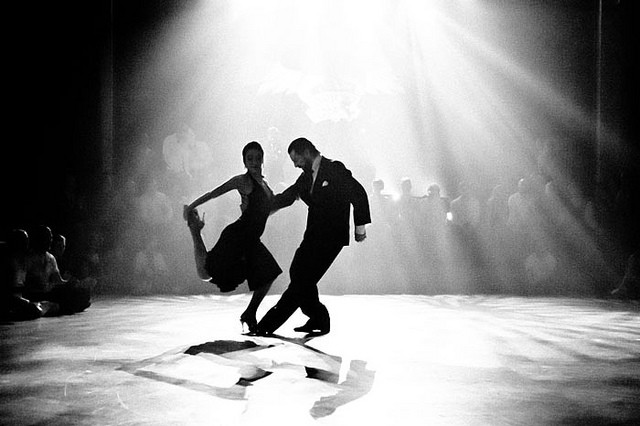Lunfardo: The Language of the Outlaws in Buenos Aires
Rumour has it that Spanish in Argentina is, for lack of better words, a doozy. Aside from shared European language linguistics, there’s something else that adds to the dialect that discerns it even within Argentina itself: Lunfardo.
Originating in Buenos Aires, Lunfardo is the particular local vernacular that, if you’re not careful, might just knock you for a loop. To help you get through the hurdles, we’re here to give a little more context and teach you the leyes of the land.
Explore our Spanish courses with qualified native teachers in your city and online!
So, what is Lunfardo?

Outlaws via Wikimedia
Lunfardo or Lunfa, as it’s affectionately known, takes its name from the Italian “Lombardo”, which denotes an inhabitant of Lombardy in Italy. In several Italian dialects, and this is where the fun comes in, it also denotes “outlaw”.
It is a form of slang which began to ingrain itself in Argentina towards the end of the 19th and into the early 20th centuries. Thereafter traversing the River Plate to the adjourning areas of Montevideo, Uruguay and Rosario, the capital city of a bordering province.
In its original guise, this vernacular was principally spoken among criminals or chorros/malandros in Spanish. The reason owing to the vernacular’s rapid growth was down to the need to maintain private conversations out of earshot from local prison guards, who could have prevented their criminal activities.
Likewise, during this time period, Cocoliche, which is a pidgin mix of Spanish and Italian, along with outside influences from the gaucho dialect, indigenous languages, French, and Portuguese led to terms that were all incorporated into Lunfardo, thereby further enriching its lexicon.
Similar to a phenomenon in the French argot Verlan (l’envers), it should be noted though that several Lunfardo terms are simply Spanish words which have been rearranged backwards or in reverse order. This practice is known as “vesre”, or in Spanish “revés”.
Gradually, over time, with the language disseminating, it began to take root within common parlance. The incorporation was further encouraged alongside the transformation taking place during the golden age of Tango, to which Lunfardo owes for its popularity and exposure in the lyrics. Edmundo Rivero was an Argentine tango singer and also a practitioner of this language. His song, “Milonga Lunfarda” recounts adopting such terms.
En este hermoso país que es mi tierra, la argentina,
La mujer es una mina y el fueye es un bandoneón.
El vigilante, un botón, la policía, la cana,
El que roba es el que afana, el chorro un vulgar ladrón,
Translation:
In this beautiful country which is my land, Argentina
The lady is a mina and el fueye is an bandoneón/accordion
The vigilante, a botón, the police, la cana
He who robs is he who afana, el chorro a vulgar thief,
And these examples are just the beginning. Check out some other terms to be aware of:
- buchón – to rat on, informer to the law
- fiaca – laziness, or lazy person (from the Italian fiacca “laziness, sluggishness”)
- gomías – friends (vesre for amigos)
- guita – money
- lorca – hot, as in the weather (vesre for calor “heat)
- quilombo – racket, ruckus, disorder, mess; also slang for brothel
- pibe – like “kid”, a common term for boy or, in more recent times, for young man
Verbs
- cerebrar – to think something up (from cerebro, “brain”)
- engrupir – to fool someone
- laburar – to work
- manyar – to know / to eat
- morfar – to eat
- pescar – to know (vesre from the Italian capisce “do you understand?”)
- chamuyar – to sweet talk

Tango dancers in Argentina via Flickr
So, Are the Outlaws Gone?
Currently, Lunfardo as a vernacular has fallen into disuse in Argentina today. Originally, it was perceived to belong to the golden age of tango, criminality and what made it most interesting originally as a social dialect, was how it was spoken by the lower class immigrants and helped to set apart their language from different strata of society at the time. It helped to identify them and gave them their own sense of heritage and belonging through its use.
Nevertheless, its contribution towards the current Spanish in Argentina cannot be overlooked. It is extremely common for Porteños to use such terms without consideration, whilst others have fallen by the wayside over the years. The term trucho/a means trout. However, this has been adopted to signify fake or poor quality, which will be branded about anything not quite up to scratch in someone’s mind. Likewise, if someone has questionable integrity it is common to hear people referred to as ‘chamuyero/a’, meaning a liar, deceitful person, or a swindler. What sets Lunfardo apart nowadays is how it peppers common speech. This has helped to maintain it today, if only in part for a language believed to originally contain 5,000 words during its height.
Overall this contribution has helped to enrich Argentina’s own sense of language and cultural heritage, liking the past and present. It has helped to define class and heritage too. Ultimately the influence which is reflected in common speech is one of the defining features which helps to set Argentina’s Spanish apart from other Spanish dialects in the continent.
Explore our Spanish courses with qualified native teachers in your city and online!
